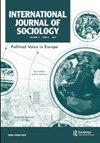CAMP MANAGEMENT AND THE RIGHT TO FOOD FOR ELDERLY REFUGEES: A CASE STUDY OF NYARUGUSU REFUGEE CAMP, KASULU DISTRICT IN TANZANIA
IF 1.1
Q2 SOCIOLOGY
引用次数: 1
Abstract
Purpose: The purpose of this study was to examine how camp management ensures the right to food for elderly refugees in Nyarugusu Refugee Camp, Kasulu District in Tanzania. Materials and Methods: The study adopted a mixed method research design. The study target population was 4,080 elderly refugees aged sixty years and above and 21 senior camp managers. Stratified and purposive sampling techniques were used to obtain the sample for the study. Krejicie and Morgani (1970), was used to obtain a sample of 344 elderly respondents and purposive sampling to select 21 senior camp managers. The study used questionnaires and in-depth interview guide to collect primary data. The collected quantitative data was analyzed with the aid of SPSS using descriptive statistics such as mean, standard deviation, frequency and percentage. The qualitative data collected using interview guides was analyzed thematically using content analysis. The results were presented in tables, charts and bars. Results: The study found that most of the elderly refugees involved in the study had no idea what camp management entailed. The study also found that most of the elderly refugees aged 60 years and above in Nyarugusu Refugee Camp Kasulu District in Tanzania were not able to find all the food they would have liked. Further, the study found that satisfactorily nutritional status is paramount so as to meet the dietary needs of the elderly. The study also found that overcrowding in Nyarugusu Refugee Camp, Kasulu District in Tanzania was hindering the ability of the camp management to provide the elderly with sufficient food to a very great extent. Unique contribution to theory, practice and policy: The study recommended that there is need for the camp management in Nyarugusu Refugee Camp, Kasulu District in Tanzania to create awareness amongst refugees themselves and humanitarian organizations, and risk assessment and interventions to improve access to an adequate and appropriate diet for the elderly refugees aged 60 years and above.难民营管理和老年难民的食物权:坦桑尼亚卡苏鲁地区尼亚鲁古苏难民营个案研究
目的:本研究的目的是研究难民营管理如何确保坦桑尼亚卡苏鲁地区尼亚鲁古苏难民营老年难民的食物权。材料与方法:本研究采用混合法研究设计。研究的目标人群是4 080名60岁及以上的老年难民和21名高级难民营管理人员。采用分层和有目的抽样技术获取研究样本。采用Krejicie和Morgani(1970)的方法获得了344名老年受访者的样本,并通过有目的抽样选择了21名高级营地管理人员。本研究采用问卷调查法和深度访谈法收集原始数据。收集到的定量数据使用SPSS软件进行分析,使用描述性统计,如平均值、标准差、频率和百分比。使用访谈指南收集的定性数据使用内容分析进行主题分析。结果以表格、图表和条形图的形式呈现。结果:研究发现,参与研究的大多数老年难民都不知道难民营管理需要什么。该研究还发现,坦桑尼亚尼亚鲁古苏难民营卡苏鲁区的大多数60岁及以上的老年难民无法找到他们喜欢的所有食物。此外,研究发现,要满足老年人的饮食需要,良好的营养状况至关重要。研究还发现,坦桑尼亚卡苏鲁区的尼亚鲁古苏难民营过度拥挤,在很大程度上妨碍了难民营管理部门向老年人提供足够食物的能力。对理论、实践和政策的独特贡献:该研究建议坦桑尼亚卡苏鲁区尼亚鲁古苏难民营的营地管理需要提高难民本身和人道主义组织的认识,并进行风险评估和干预,以改善60岁及以上的老年难民获得充足和适当饮食的机会。
本文章由计算机程序翻译,如有差异,请以英文原文为准。
求助全文
约1分钟内获得全文
求助全文

 求助内容:
求助内容: 应助结果提醒方式:
应助结果提醒方式:


